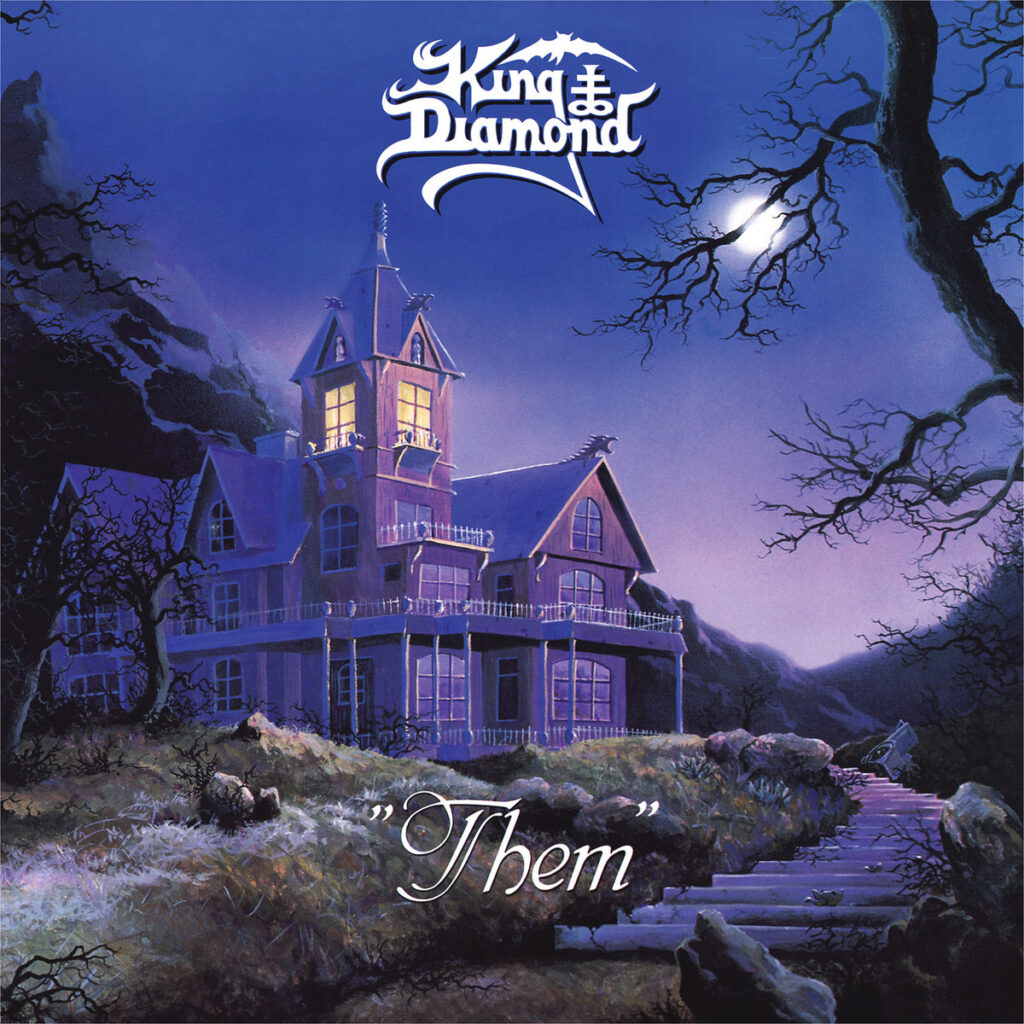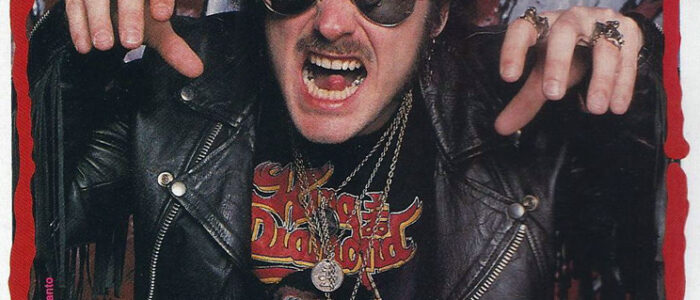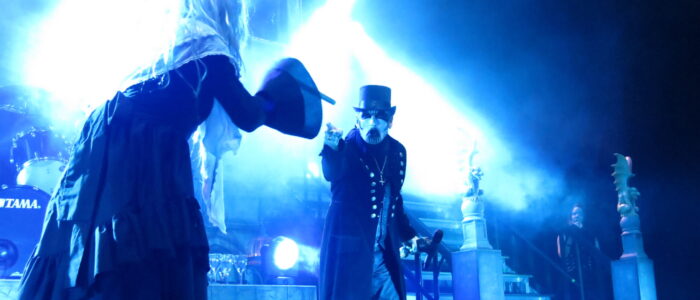Welcome back to Reviews from the Aural Realms, a series from Other Worlds Than These where I explore music that moves me—emotionally, creatively, and sometimes even spiritually.
In my previous review, I drifted through the serene soundscapes of Flow (Remastered) by Jon Jenkins, a journey through tranquility and atmosphere.
👉 Read that review here
But today, we’re steering straight into the shadows—into a world of haunting whispers, flickering candles, and voices that tell stories from beyond. We’re crossing to the other side of the spectrum with the first King Diamond album I ever experienced: the chilling, theatrical masterpiece Them.
When I mentioned to a friend that this was next on my list, he laughed and said, “You’re doing a review of a 30-year-old King Diamond album? I mean, it’s an all-time classic—but a bit late for a new review, innit?”
And maybe he’s right… but that’s never been the point of this series.
Reviews from the Aural Realms isn’t about always showcasing the “new and shiny.” It’s also about revisiting the music that has shaped who I am—both as a listener and as an artist—and introducing those sounds to anyone who may have missed them the first time around. Some of these albums are new discoveries; others are old companions that continue to inspire me creatively, spiritually, and sonically.
I only wish I’d gotten to this review during October—it would have been a perfect fit for Halloween. But, well… I got a little delayed due to an unfortunate turn of events. For more on that story, see Prove Life Wrong: Redux.
Discovery & First Impressions
September, 1988.
I still remember the moment like it was yesterday. I was riding shotgun in my friend’s car when he turned to me and said, “The new King Diamond album is out. I got it today — it’s pretty damned good.”
At the time, I had no idea who he was talking about. King who? I thought. But before I could ask, he was already sliding the cassette into the deck. “Want to listen?” he asked. “Sure,” I said — not realizing I was about to be completely transformed as a listener.
The car filled with the eerie intro of “Out of the Asylum”, and I instantly knew this was something different. It wasn’t just another metal record — it was a story, a full-blown concept album with cinematic ambition. The production, the atmosphere, the way each sound felt like part of a larger narrative — it all hit me like a revelation.
And then came “Welcome Home.” That guitar riff. That haunting melody. And, of course, that voice. King Diamond’s now-iconic falsetto sliced through the speakers like nothing I’d ever heard. At first, I was stunned — almost confused. What was I hearing? It was theatrical, unnerving, and absolutely electrifying. But within five minutes, I was hooked.
At that time, I was already listening to plenty of metal — Iron Maiden, Metallica, Queensrÿche, the greats — but I’d never heard anything like this. There was a deliberate madness to it, a kind of twisted beauty in how it blended horror and melody. It wasn’t just music; it was storytelling with teeth.
When the last notes of the album faded out, my friend turned to me with a grin.
“He’s coming to concert. Wanna go?”
There was no hesitation.
“Oh hell yeah,” I said. Then, louder —
“Oh Hells Yes!”
That moment marked the beginning of my fascination with King Diamond — the storyteller, the showman, and the sorcerer of sound.
About the Album
Released in 1988, Them is one of King Diamond’s most chilling and psychologically complex concept albums — a twisted tale of family, madness, and supernatural possession that plays out like a haunted opera. Where Abigail was a gothic ghost story, Them dives inward — into the mind of a young King himself — blurring the line between reality and the voices that whisper from beyond.
The story begins as King, his mother, and his sister Missy welcome their grandmother home from a mental asylum. That night, King hears strange voices and discovers Grandma having a tea party — apparently alone — though teacups and kettles float in midair as if held by unseen hands. She invites King to join her, to sit in her chair, and before sending him back to bed, she locks eyes with him and commands him to forget what he’s seen.
The following day, Grandma awakens King and begins to teach him about the House of Amon, claiming the family’s teapot — ominously named Amon — as an object of great power. Through it, “They” — the ghostly entities haunting the house — can communicate and exert control, but only when fed with blood. In a horrifying ritual, Grandma cuts King’s sleeping mother’s hand and mixes her blood into the tea. When King drinks it, the voices take hold of him, leaving him entranced and pliable.
As his mother weakens under “Their” influence, Missy begs King to call for help, but his thoughts are clouded and his obedience to “Them” deepens. In anger and confusion, he severs the phone line, cutting off their last connection to the outside world. During another tea gathering, Missy interrupts in outrage over their mother’s condition — and in that moment of fury, she smashes Amon, the sacred teapot. The result is catastrophic. “They,” enraged at the destruction of their vessel, murder Missy, chopping her to pieces and throwing her remains into the kitchen fireplace.
The spell broken, King awakens from his trance and realizes the horror of what has transpired. Outside the house, where “Their” power weakens, he turns on his grandmother and kills her in an act of vengeance and desperation. But the damage is already done. The voices remain. King is later found, delirious and raving, and confined to the very asylum from which his grandmother had returned.
Years later, the story comes full circle: King is released — and upon returning home, he finds the House of Amon waiting for him. The voices are still there. Grandma is still there. And Them… are still very much alive.
Musically, Them is an unrelenting masterwork — one of King Diamond’s most meticulously structured narratives. Every song functions as a scene, each riff and vocal inflection part of the album’s macabre choreography. The guitars of Andy LaRocque and Pete Blakk cut through the story like blades, while Mikkey Dee’s drumming adds the relentless heartbeat of dread. King’s voice — shifting seamlessly between childlike innocence, unhinged mania, and demonic authority — gives life to every character, turning this record into a true metal horror opera.
Even now, Them remains one of King Diamond’s most haunting works — a story that crawls under your skin and lingers long after the final scream fades. It’s not just a concept album; it’s a descent into madness, a twisted family tragedy, and a masterclass in theatrical storytelling.
Track-by-Track Reflections
Revisiting Them all these years later feels like opening a long-sealed door in the mind — the kind that creaks with memory and still smells faintly of old cassette tape and teenage adrenaline. The moment that eerie piano and laughter from “Out of the Asylum” returned through my speakers, it was as though no time had passed at all. That same uneasy thrill I felt in my friend’s car in 1988 came rushing back, only this time with a deeper appreciation for what I was actually hearing.
Back then, I only knew that I loved it. Now, I can recognize just how meticulously crafted this album truly is. Every tempo change, every transition between songs, every haunting motif serves a purpose in the story’s descent into madness. Listening to Them today, especially with modern clarity, it’s impossible not to admire the precision behind the chaos — the balance of technical musicianship and cinematic tension that defines King Diamond at his best.
This isn’t just nostalgia; it’s realization. The album that once startled me has aged into a masterpiece I can now dissect and appreciate from every angle. The story still chills, the riffs still bite, and King’s voice still sends that unmistakable shiver down the spine. Some albums fade with time — this one still haunts.
🌀 Some of the songs featured below are part of the official Reviews from the Aural Realms Playlist on Spotify. Dive in and listen along.
1.Out from the Asylum
The album opens not with a scream or a riff, but with something far more unsettling — an eerie organ and a ghostly piano melody that immediately sets the tone for what’s to come. The music begins slow and deliberate, like a procession winding through the fog, before quickening its pace as the tension rises. You can almost feel the dust and cold air of the old House of Amon as its doors creak open for the first time in years.
Then come the whispers — faint, echoing, and otherworldly. “Them” have awakened. The unseen voices murmur and question, wondering why Grandma is returning home… and why she’s in a wheelchair. Their curiosity isn’t innocent; there’s a sense of calculation in the way they speak, a dark delight at the chaos to come. But even malevolence has its charm — after all, Grandma does make a good cup of tea.
King Diamond’s mastery of atmosphere is immediately evident here. In less than two minutes, he manages to establish setting, characters, and tone without a single guitar riff or drumbeat. We hear Mother speaking to Missy, urging her to behave, while admonishing King to stop “playing that thing” — clearly the little toy piano we’ve been hearing since the track began. It’s a brilliant piece of sound design, using subtle narrative clues to build a sense of place and foreshadow what’s coming.
By the time the track fades, the listener is no longer simply hearing an introduction — they’ve been invited into the story. The Asylum has opened its gates, Grandma has come home, and the voices are already whispering behind the walls.
2. Welcome Home
If “Out from the Asylum” was the creak of the door opening, “Welcome Home” is the blast of cold air that rushes in behind it. The song launches with rapid-fire drumming and razor-sharp rhythm guitars, instantly igniting the story into motion. Then comes that moment — the line that would become one of King Diamond’s most iconic:
“GRANDMA! WELCOME HOME!”
The first time I heard it, I was floored. King’s falsetto hit like a jolt of electricity — eerie, theatrical, and unlike anything I’d ever encountered. Within seconds, the screeches, growls, and melodic phrasing all converged into a chaotic brilliance that felt both terrifying and exhilarating. I didn’t know what to think at first… but by the time he sang “Let me help you out of the chair — look at Grandma,” I was hooked for life.
This track captures everything that makes Them unforgettable: energy, precision, and theatrical storytelling. The song moves at two distinct paces — fierce and fast in one breath, patient and eerie in the next — perfectly mirroring the twisted family reunion taking place within the lyrics. Grandma’s return isn’t just a visit; it’s a summoning, and King’s layered vocals make you feel like the entire house is speaking through him.
The vocal layering here is masterful. King’s ability to embody multiple characters — shifting from childlike wonder to malicious laughter — turns the song into a full-blown performance. It’s heavy metal, yes, but also psychological theater, the kind of thing that made him utterly unique in the scene.
I’ve played this song countless times at home, and it never loses its spark. My wife, who’s not particularly fond of the falsetto, still appreciates the sheer theatrics of it all. She was even supposed to come with me to see King live last year — unfortunately, she fell ill and couldn’t make it. Hopefully, next time.
Whenever I introduce someone new to King Diamond, this is the track I start with. For some, Abigail might be the defining album, but for me, Them holds that honor — and “Welcome Home” is its heartbeat.
I’ll never forget seeing him live in December of 1988, performing the entire album on stage — the candles, coffins, costumes, and that unmistakable voice filling the room like a living horror play. It was pure theater, and the growls and falsettos hit even harder in person.
I always get a kick out of people who only know me through my ambient and cinematic work — and then discover that I’m a die-hard King Diamond fan. The look on their faces when I blast “Welcome Home” is priceless. They’d never guess that the same guy who writes peaceful soundscapes is also headbanging to tales of haunted tea parties and spectral possession. But that’s the beauty of music — there are other worlds than these, and King Diamond’s is one I’ll always revisit.
3. The Invisible Guests
The story deepens — and the shadows in the house begin to move on their own.
“The Invisible Guests” picks up right where “Welcome Home” leaves off, plunging us back into the nightmare as King awakens from uneasy sleep, disturbed by a chorus of disembodied voices and hysterical laughter coming from Grandma’s room. The sound of it is enough to make your skin crawl — an aural swirl of madness that grows louder as King creeps closer down the hallway.
He peers through the doorway and sees Grandma sitting alone, but the air around her is alive with whispers and motion. Cups rise and tilt in midair, pouring themselves out onto the floor — unseen hands serving unseen guests. It’s here that the full meaning of Them begins to take shape. These aren’t just ghosts; they’re the Invisible Guests — entities drawn to the blood and the tea, the voices manipulating both the house and its inhabitants.
Grandma, ever the keeper of twisted secrets, notices King watching and smiles that eerie smile. “You must forget what you’ve seen,” she insists, her voice calm but commanding. It’s a chilling line — a moment where the story slides from mere hauntings into psychological control. The power dynamic between King and Grandma shifts here, and you can feel it musically in the way the song drives forward.
Because make no mistake — this track bangs. Musically, it’s every bit as powerful as “Welcome Home.” The guitars rip through with searing harmonies, while Mikkey Dee’s drumming provides a relentless undercurrent of menace. The riffs gallop and twist in classic King Diamond fashion — sharp, melodic, and loaded with tension — while King’s multi-layered vocals once again command the scene like a demonic puppet master conducting both the living and the dead.
What I’ve always loved about this song is how it balances storytelling and sheer metal force. Even as the lyrics describe floating teacups and ghostly guests, the music itself mirrors the chaos — everything in motion, nothing at rest. It’s fast, unhinged, and theatrical in all the right ways.
By the end of the track, Grandma’s words linger like a curse: “Forget what you saw.”
But, of course, you can’t. Neither can King. And that’s exactly how Them tightens its grip.
4. Tea
The ritual begins.
“Tea” opens with Grandma waking King from sleep, her voice soft yet commanding in the way only she can be. The tone is almost tender at first, but there’s a sinister undercurrent, an unease that seeps through every word. She tells him it’s time to learn about the House of Amon, and with that, the haunting phrase that becomes the song’s refrain:
“It is time for tea… it is time again.”
The track wastes no time plunging us back into the nightmare. King soon realizes his mother is present too, though she’s motionless — asleep in the rocking chair, her breathing shallow, as if already under some kind of spell. Then comes the moment that defines the album’s ritualistic horror: Grandma cutting into his mother’s hand, letting the blood drip into the teapot. The tea — the same tea the voices demanded — becomes the medium of communion between the living and Them.
The chorus of “It is time for tea, it is time again” is deceptively simple but unforgettable. It loops in your head like an incantation, a mantra equal parts sinister and hypnotic. Musically, it’s one of King Diamond’s most perfectly constructed moments — the shifting tempos, the back-and-forth between rapid-fire riffs and mid-tempo grooves, all underscoring the scene’s macabre elegance.
King’s vocal performance here is phenomenal — layered and multifaceted, moving between innocence, delirium, and dark revelation. You can hear him slipping under Grandma’s control, as though each verse pulls him deeper into Their spell. There’s a strange beauty in the way he describes his altered state — “I felt as if I was in heaven” — a chilling testament to the seduction of madness.
I have to admit, this song has stuck with me over the years in more ways than one. Whenever my wife and I make tea, I sometimes catch myself quietly whispering, “It is time for tea…” — and she’ll look at me with that familiar “What are you saying?” expression. I just smile and say, “Oh, nothing — just singing.”
That’s the kind of hold King Diamond’s music can have — it embeds itself in your memory, its phrases becoming little echoes that resurface at unexpected times.
From a performance standpoint, “Tea” is a masterclass in dark storytelling through music. The transitions, the intricate time signatures, and the shifting tones make it one of the most cinematic songs on the album. If you’ve never seen King Diamond live, this is one of those tracks that absolutely cements why you should. It’s not just a concert — it’s theater, shadow, and ritual colliding on stage.
When he performs it, you don’t just hear the song — you witness the ceremony.
5. Mother's Getting Weaker
By the time “Mother’s Getting Weaker” begins, the madness has taken root. The ritual is complete, and its effects are spreading through the family like a sickness.
The song opens with more electrifying guitar work, the twin harmonies slicing through the tension with surgical precision. King’s storytelling voice steps back into focus, and we see the next tragic stage unfold: Mother’s decline. Each day she grows paler, weaker — the life seemingly drained from her by the unseen forces at work in the house.
Through King’s eyes, we hear the confusion and conflict. Missy, his sister, pleads for him to see what’s happening — to call for help — but he’s already under Their spell, too far gone to truly understand what’s real anymore. Her love turns to frustration, and frustration to hatred, as she watches her brother slip away. The emotional tension here is palpable; it’s the breaking point before everything truly collapses.
Musically, the track is tight and dynamic, carried by Andy LaRocque’s precision guitar work and Mikkey Dee’s relentless drive on drums. The riffs remain sharp and sinister, though slightly less immediate than what came before. It serves its purpose as a crucial part of the story’s structure — a dark bridge between revelation and tragedy — but for me personally, it’s not one of the standout tracks.
There’s nothing wrong with it by any means; it’s just that by this point in the album, the adrenaline has been running so high that “Mother’s Getting Weaker” feels like a brief moment to catch your breath before the next descent. You can almost sense that King is preparing you for what’s coming — a calm before the storm.
Even so, this track plays a vital role in the narrative arc. It’s the sound of the house tightening its grip, of love and family unraveling under supernatural control. And while it may not hit as hard musically as “Welcome Home” or “Tea,” it’s the emotional fracture point — the moment when everyone in the story begins to realize that something truly monstrous is at work within the House of Amon.
6. Bye, Bye, Missy
After the uneasy calm of “Mother’s Getting Weaker,” “Bye, Bye, Missy” slams the story back into motion — and back into horror.
It begins with a simple but commanding rhythm, a driving pulse that instantly draws you in. The guitars churn with controlled fury, and you can feel the story tightening around its central tragedy. The House of Amon is no longer merely haunted — it’s hungry, and “They” are ready to feed again.
Grandma opens the door to find Missy, her innocence now replaced by sheer terror. She’s seen too much — her mother’s frailty, the unnatural behavior, the whispers in the house — and now the horror is staring her directly in the face. The confrontation unfolds like a stage play drenched in blood and shadow: Missy trembling, Grandma smiling, the voices of Them swirling unseen in the air.
King Diamond delivers one of his most chilling lyrical moments here:
“I saw Missy struggling
In Grandma’s wrinkled hands…”
That line still hits hard, no matter how many times you’ve heard it. It’s vivid and cruel, and you can almost see the struggle — the old and the young locked in a fatal dance under the watchful eyes of the invisible guests. Missy, desperate and defiant, threatens to destroy the teapot — the vessel of Their power — but it’s already too late. The moment she raises her voice, They react.
King hears Their laughter, the clatter of dropped teacups, and then… silence.
Missy descends the stairs in tears — a moment of pure despair before the inevitable. We can feel her slipping away, even before the lyrics make it clear what’s coming next. The tension in the music mirrors it perfectly: sharp riffs, galloping drums, and King’s overlapping vocal layers that twist between panic and detachment.
What I love most about this track is how it pulls you right back into the emotional core of the story. After a brief lull, “Bye, Bye, Missy” re-energizes the album with both narrative weight and raw musical drive. It’s tragic, theatrical, and brutally effective — one of those songs that reminds you exactly why Them is as much a horror film in sound as it is a metal masterpiece.
7. A Broken Spell
The aftermath.
“A Broken Spell” opens like the sound of waking from a nightmare — that slow, dreadful moment when you realize the nightmare was real. The teapot has been shattered. Their link to the living world is weakened. The house, once alive with whispers, now hums with a quieter, colder kind of terror.
King is tormented, his mind a battlefield between control and collapse. The spell is breaking, but so is he. Reality comes crashing in as he begins to comprehend what’s happened — what Grandma has done — and the price Missy has paid. You can hear it in his voice: the confusion, the sorrow, and the emerging hatred for the one who twisted his family into this madness.
Musically, this track is a storm. It’s pure heavy metal at its most visceral — gritty, relentless, and fiercely cinematic. The tempo shifts constantly, the riffs gallop and churn with violent momentum, and the drums feel like they’re trying to punch a hole through the walls of the House of Amon itself. King Diamond was never content to sit still musically, and this song proves it. The frequent time signature changes keep the listener off balance, mirroring King’s fractured state of mind.
Midway through, the tone shifts. The aggression gives way to a moment of eerie calm — almost ballad-like — as if King’s mind briefly escapes the torment and drifts into sorrowful reflection. It’s beautiful in its own way, a fragile pause before the inevitable return to chaos. Then, as if pulled back into the nightmare, the song surges forward again, locking back into its heavy rhythm with renewed fury.
One of my favorite things about “A Broken Spell” — and really, about this entire album — is how Andy LaRocque and Pete Blakk trade guitar solos like dueling spirits. Their interplay throughout Them is phenomenal, and here it’s especially striking: precise, emotional, and constantly pushing against the edge of control.
This track feels like a turning point. King’s innocence is gone, replaced with rage and grief. The spell may be broken, but its scars remain. By the end, he’s no longer the boy who played the toy piano — he’s something else now, something shaped by blood, loss, and vengeance.
8. The Accusation Chair
Every story like this needs its reckoning — and “The Accusation Chair” is exactly that.
The spell is broken. The truth is clear. King’s mind, once clouded by Their whispers, now burns with clarity and rage. The voices have lost their grip, and the fear that once paralyzed him has transformed into fury.
The track begins with that classic King Diamond energy — sharp, fierce, and tightly wound — as King searches through the dark halls of the House of Amon, calling out for Grandma. When he finally finds her, she’s alone in her room, stripped of her supernatural protection. They are silent now. The power dynamic has reversed, and for the first time, Grandma feels small.
King confronts her — the woman who manipulated him, who sacrificed their mother, who caused Missy’s death. What follows is one of the most pivotal moments of the entire album, and though I won’t spoil exactly what happens, it’s safe to say the confrontation turns violent. The image of King seizing her cane is both symbolic and literal — the moment he finally takes control back from her.
Musically, this song maintains the album’s relentless momentum, even if it doesn’t hit me as hard as some of the others. It serves as a vital narrative crescendo, more about storytelling than sheer adrenaline. Still, the guitar solos by Andy LaRocque and Pete Blakk are once again superb — melodic, emotional, and full of restrained fury. Their interplay elevates the track, adding depth and tension to the unfolding scene.
It’s in the final section, though, that the song truly comes alive for me again. King’s low, growling vocal delivery adds a new texture — darker, more guttural, almost sorrowful. It’s as if all the grief and rage that’s been building finally boils over. He sees Their eyes — not Grandma’s, but Them’s — watching as he runs, their presence still lingering in the air, still waiting for their next chance to reclaim him.
“The Accusation Chair” may not be the most explosive track musically, but it’s a crucial one emotionally. It’s the sound of vengeance and collapse, of the story’s core unraveling at last. The boy who once obeyed is gone — what remains is the survivor, fleeing the ruins of the House of Amon with both blood and memory on his hands.
9. Them
After the chaos, silence.
“Them” begins with a soft, acoustic passage — delicate, almost fragile — a haunting contrast to the furious metal that’s come before. It feels like the house itself is exhaling, its walls sighing in the aftermath of what’s unfolded. The notes drift like dust in moonlight, slow and spectral, as if the music is searching for what’s left of the souls that once occupied this place.
Then, from that stillness, come the chants — low, echoing, and otherworldly. The voices of Them rise once more, not with the wild power they once held, but with something colder: persistence. They are never gone. They whisper faintly through the atmosphere, mocking and omnipresent, their tone carrying both menace and inevitability.
This track is an instrumental in form but not in spirit. Even without verses or screams, it tells a story all its own. The brief, growling whisper from King — “We are stronger than you” — cuts through the haze like a voice from the void, a reminder that even when the nightmare seems to end, it never truly does.
At just over a minute long, it’s more of a haunting vignette than a song — a bridge between physical horror and psychological torment. Yet it’s one of those moments that lingers. Them are calling him back. The ritual might be broken, but their connection remains.
Cinematic, dark, and deceptively simple, this piece feels like the echo of everything that’s come before — the whisper before the final act begins.
10. Twilight Symphony
The morning after.
“Twilight Symphony” opens with the chill of dawn breaking over the House of Amon. The frenzy has ended, and what remains is the hollow aftermath. The police have arrived. The nightmare has bled into daylight. King is being taken away for what he’s done — or at least, what they believe he’s done. The horror has shifted from the supernatural to the psychological, from the house’s haunted halls to the cold, clinical reality outside.
The voices of Them still linger, though — their presence threaded throughout the music and chorus. “Twilight Symphony!” King cries, and we hear the reply echoing back, spectral and taunting: “THEM!” It’s one of those moments where the story and the sound intertwine so completely that it’s impossible to separate them. You can feel the pull between madness and memory — King’s mind fractured, but still tethered to the whispers that destroyed his world.
Musically, this one doesn’t quite grab me as a standalone piece in the same way that “Welcome Home” or “Tea” does. It’s not the kind of track I’d queue up on its own. But within the context of the album, it’s indispensable. It’s the epilogue to a nightmare — a chapter that bridges violence and consequence, illusion and awakening. Without it, the story wouldn’t land with the same weight.
This is where King’s theatrical genius really shines — not just in the high moments, but in how he paces the aftermath. He doesn’t rush the descent. He lets you sit in it, lets you feel the confusion, the guilt, and the unrelenting shadow of Them.
By the end, time has moved on. The sirens fade. The echoes of the house grow still. And as King is taken away, there’s one final truth whispered beneath the music — even if you escape the House of Amon, you never really leave.
11. Coming Home
The door creaks open one last time.
“Coming Home” begins with the delicate chime of a music box, that fragile sound we associate with childhood, innocence, and things long lost. Then, the soft notes of the toy piano return — the same sound that first appeared in “Out from the Asylum,” now reemerging like a memory drifting through time. It’s as if we’ve come full circle, right back to where the nightmare began.
King has been released. He’s older now, changed, and broken in ways even he doesn’t fully understand. Yet something — perhaps guilt, perhaps fate — has drawn him back to the House of Amon. The melody he plays feels almost like a lullaby to himself, a haunted echo of everything that transpired within those walls.
And then, from the stillness, a familiar voice answers:
“Come inside, my dear.”
It’s Grandma.
And with those words, the illusion of peace collapses. They are there too — the invisible guests, waiting patiently in the shadows. Even Missy’s presence lingers, a ghost among ghosts. The voices call once more, whispering the words that started it all: “It is time for tea.”
No guitars. No drums. No thunderous finale. Just story — quiet, eerie, and devastating in its simplicity. This isn’t a song meant to make you headbang; it’s one that makes you sit still and shiver.
“Coming Home” closes Them not with resolution, but with inevitability. The cycle has begun again. The tea will be poured, the whispers will rise, and the horror will continue — forever repeating within the walls of the House of Amon.
A perfect ending. A perfect return.
12. Phone Call (Bonus Track)
Just when you think the story is over, the phone rings.
“Phone Call” serves as a short but deeply unsettling epilogue to Them. The chaos has ended, the house stands silent, and King — now confined to his fractured mind — receives a call that should be impossible.
It’s Grandma.
Her voice, faint and crackling through the receiver, cuts through the static like a whisper from the grave. She’s calling him back to the house, beckoning from the other side, her tone sweet and familiar — the kind of sweetness that only makes it more disturbing. King listens, torn between disbelief and recognition, as his fragile grip on sanity begins to dissolve once again.
There’s not much to dissect musically here; this piece is minimal, atmospheric, and purely narrative. But that’s exactly what makes it effective. It’s the final twist of the knife — the moment that confirms what “Coming Home” implied: King never truly escaped. The voices will always find him.
It’s a haunting way to close the album — not with a scream, but with a quiet, ringing reminder that in King Diamond’s world, the story never really ends.
Final Thoughts
As I’ve noted throughout, Them remains my favorite King Diamond album. It’s the one that hooked me, haunted me, and has stayed with me for decades. Even though the final tracks step back from the “bang” of the earlier songs, they’re absolutely crucial to the story — they give the chaos its shape, the horror its consequence, and the narrative its sense of dreadful closure. Without them, the album would lose the very thing that makes it so powerful: its continuity of madness.
Now, I understand — King Diamond isn’t everyone’s cup of tea. (Just ask my wife.) The falsetto alone can send some people running for the volume knob. But for me, his music has always been something more than just metal. It’s art through performance, a masterclass in blending narrative, musicianship, and atmosphere into a cohesive world that pulls you in — whether you’re ready or not. His work is theatrical, unapologetically strange, and utterly his own. And that’s exactly why it resonates so deeply with me.
It’s not just that I love this album — it’s that I feel it. From the chilling opening of “Out from the Asylum” to the ghostly whispers of “Coming Home,” the music becomes an experience that lingers in your imagination long after it’s over. Even now, years later, I can close my eyes and see the candlelit rooms, the flickering shadows, and that ever-present teapot waiting in the corner.
Of course, I’d still encourage you to give it a try — even if you’ve never ventured into King Diamond’s world before. You might be surprised. And if you do, let me know your thoughts — good or bad. I promise I won’t send Grandma after you if you don’t like it. I’ll just pour myself a nice cup of tea before I reply.
Because in the end, Them isn’t just an album — it’s a legend whispered over a steaming teacup, a symphony of shadows that continues to echo long after the final note fades.
About the Artists
Few artists in heavy metal — or in music at all — embody theatrical storytelling quite like King Diamond. Both a character and a creator, he stands as the singular architect of a sonic horror universe all his own. With his unmistakable falsetto, corpse-painted visage, and obsession with the macabre, King Diamond doesn’t just perform songs — he summons narratives, blurring the boundaries between metal, theater, and cinematic sound design.
Emerging from the shadows of his first band, Mercyful Fate, King Diamond forged his solo identity in the mid-1980s, crafting concept albums that played out like gothic operas — complete with recurring characters, haunted settings, and supernatural tragedies. His albums weren’t mere collections of tracks; they were musical films for the mind, each unfolding scene by scene through riffs, voices, and atmosphere.
Lyrically, King Diamond draws from the same dark well as classic horror literature — channeling influences from Poe and Lovecraft to Hammer Films — but infuses them with an emotional immediacy and precision few can match. His ability to shift between multiple vocal personas — from the sinister whisper to the piercing wail — gives his stories life and tension, as though he’s both director and cast in his own haunted production.
Across albums like Abigail, Conspiracy, and Them, King Diamond has become not just a musician, but a mythmaker — a chronicler of curses, haunted houses, and fractured minds. His music sits at the crossroads of metal, theater, and psychological storytelling, where every note drips with atmosphere and every lyric feels like a turn of the script.
Even decades later, his work remains instantly recognizable, both for its sonic power and its fearless embrace of concept and continuity. To experience King Diamond is to step into a world of shadowed corridors, flickering candles, and whispered confessions — a world where the line between nightmare and melody disappears completely.
And nowhere is that vision more vividly realized than in Them — the chilling concept album that turned horror into high art.
✨ Want Your Music Reviewed? ✨
Reviews from the Aural Realms is all about spotlighting music that deserves to be heard. If you’re an artist who’d like to see your music featured in a future review, I also offer detailed review services on Fiverr — including promo clips for social media.










One thought on “Them by King Diamond”